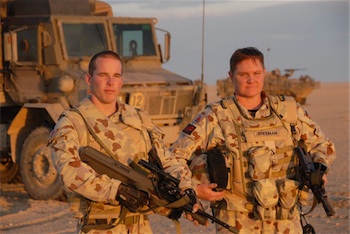
The cat vomited this morning. Again. Artemis has this habit of gorging her food and then, five minutes later, throwing up wherever she’s standing.
Today it was a projectile effort from the heights of the TV stand, a reddish-brown spatter right across the living room floor.
Remember that last time you threw up? How the acrid stomach acids burnt your throat and mouth? How it felt like it was surging up into the back of your nose? It’s just like that. Freshly warm and mixed with the reek of cheap fish.
You can’t help but get it on your hands as you wipe it up.
I’ll bet just the thought of that smell is causing tightness in your sinuses, clenching in your throat.
Wiping up cat vomit first thing in the morning is rather unpleasant, no?
If wiping up cat vomit is the worst you have to think about today, then you’re one of the luckiest bastards on this planet. It’s not a particularly demanding sacrifice to make in return for some furry companionship.
Today is, of course, Anzac Day, our national memorial for those who’ve made the ultimate sacrifice for our country, and that other country.
After writing a highly personal Anzac Day Rememberings last year, today I wanted to write something equally worthy. As I wandered the house pondering possible themes, Artemis did her projectile vomit trick. I was annoyed and, yes, disgusted. Then I was disgusted at myself for having such a strong reaction to such a minor inconvenience.
War is perhaps a little bit more inconvenient.
Especially for those who have to do the actual combat thing.
Australia is at war today — in Afghanistan and elsewhere. It’s a distant thing, though. Unlike the graphic scenes of our first television war in Vietnam, media is now tightly controlled. We rarely see anything but the approved images of Our Brave Boys and Girls.
And yet it can’t possibly be so neat and tidy.
I was moved by the comments of “War Weary” in Crikey yesterday:
I want nothing to do with commemorating the destruction to mind, body and soul that is war. For my father too, who served close to the full six years in WW2, war was a brain-altering experience.
I have two photos of him from that time: in one taken just before his departure he looks like any other young bloke of his era; and in the second, taken barely 18 months later, he has the gaunt, harrowed face of a man at least twice his age. He survived not one but numerous life-threatening incidents, each of which alone could have led to post-traumatic stress disorder — a condition he never fully recovered from to his death.
My father didn’t drink to drown his terrors. He put a tight lid on them and felt largely ashamed of his inability to keep that lid on. “I’m just not tough enough,” were some of his final words. Ours was a home strictly controlled and dominated by my father’s chronic and largely untreated anxiety and hyper-vigilance, and the necessity to keep him functioning at all costs so that he could earn our keep. It was a different, more subtle kind of violence than that of the alcoholic, but no less destructive.
As a Lebanese friend (born when the war in Lebanon started and knowing nothing else until well into his teens) remarked to me once: “It sounds like there was a war going on inside your home, whereas for me the war was always outside.”
My mother was granted a war widow’s pension after his death — but I felt moved to write a long letter to the Department of Veteran Affairs at the time, describing in summary the damage to all of us, his children. Where was the help for us? Each of us suffered long-term psychological damage, leading to enormous difficulties in establishing and sustaining intimate relationships. All of us have had to fund our own psychological help over many years. Not least this meant that our capacities to contribute positively to our communities were negatively impacted.
While Veterans Affairs and the military today clearly do recognise and attempt to mitigate the psychological damage of war, the grim reality and perniciousness of it have not yet permeated our cultural consciousness.
“War Weary” is right about the psychological damage of war, both on those who serve and on their friends and families. Their story is far from unique.
I remember one long night of chatting and drinking with a mate who’d just returned from… well, from some time away doing whatever it was that he did. He paused for a while. He looked into the distance at nothing in particular, the thousand-yard stare.
Then he started talking again.
Slowly.
Quietly.
You know, the first time you line up someone in your sights and you pull the trigger and see them drop, it’s pretty confronting. After you’ve done it a few times, you don’t… you don’t get used to it, but it does become a little less confronting.
In a firefight, look… everybody’s shooting, all the confusion… you don’t really connect specific acts with specific…
Then he paused again. He took a long slow sip of his beer. What seemed like an eternity passed before he said just one more sentence:
A knife, on the other hand, is a whole lot more personal.
Yes, “War Weary” is right. The psychological damage of war is appalling. But he or she is wrong about Anzac Day.
We don’t commemorate “the destruction to mind, body and soul that is war”. We commemorate the strength and fortitude of the individual men and women who face it, sometimes never to return, or to return… changed.
These men and women make their sacrifices in what we hope is a valuable exchange. Sometimes it’s to protect our very way of living from a clear global threat, and the exchange is clear. Sometimes it’s part of a more complex trade, where the motives are less clear. And sometimes, despite public rhetoric about some great terror, we fear that it’s really just for convenience or commerce.
Yet those men and women choose to serve and, perhaps, to be sacrificed.
They shall grow not old,
As we that are left grow old,
Age shall not weary them,
Nor the years condemn.
At the going down of the sun,
And in the morning
We will remember them.
Lest we Forget
We trust that our politicians, who decide where and when those men and women serve, make worthy decisions about this most valuable exchange.
Prime Minister Rudd, Sir, are you making worthy decisions? Please look me straight in the eye when you answer that.
[This piece was inspired by re-reading How I decide what and when to blog, and especially the quote therein from Umberto Eco. Photo credits: The rosemary sprig was taken from Matthew Hall‘s Twitter page from last year. If I owe someone for that usage, I’ll make good. The two soldiers were found on a defence industry news website, but I believe the image is © Commonwealth of Australia and therefore usable here.]


Anzac Day is about paying tribute to those brave men and women (many without a choice) who made an unbelievable personal sacrifice to protect our country. A sacrifice many would only truly realise on their return, when trying to re-enter their ‘civilian’ life with the ‘baggage’ they carried from their experiences in serving their country.
It would be an experience that only others who were by their side could hope to understand, whereas family and loved ones could only try to understand the memories they would carry with them and how it would affect them for the rest of their lives.
No matter what services and support they are given by their country on their return (and it is usually lacking somewhat), they will never, ever be able to undo the damage that will remain with them and forever change their lives and those of their families and loved ones. As ‘War Weary’ so eloquently points out, the destruction of War continues to take its toll long after ‘peace’ has been declared.
We already know, but when will we actually decide that not one more person should be sacrificed to the futility that is War?
Hello.
I printed this out and read it months ago.
As the granddaughter of Percival Frank Jones who was in the ambulance corps in Gallipoli etc… and now as a psychotherapist, every year when Anzac Day comes around I want to get on the radio and talk about Trauma. I want to talk about the causes of trauma, the symptoms of trauma and the consequences for generations to come.
Last year I took my then 7 yo boy to George St and we stood with a friend who’s worked in defence. He loved watching the marching Air Force, navy and army in their uniforms, he came home and drew pictures of men marching.
Do you know the Eric Bogle song ‘And the Band Played Waltzing Matilda?’ http://bit.ly/a5b5DP http://www.youtube.com/watch?v=GPFjToKuZQM
If you want to chat with me about trauma, we could organise to video it and I could finally voice what I’ve wanted to say every Anzac Day for years.
http://twitter.com/FrancieJones
@Frances Jones: I’m glad you found something of value in this essay. I do think it’s one of the better pieces I wrote last year.
I’m all for raising awareness of the impact of trauma, but I’m somewhat overloaded at the moment. I will contact you privately, however, because there’s some ways we can do something about this with relatively little effort. Well, little from me anyway.